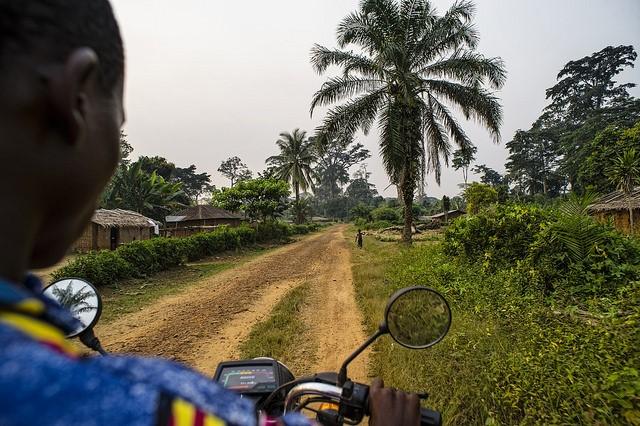Responding to the Democratic Republic of the Congo (DRC) Ebola outbreak is going to be difficult and costly, and though the effort is off to a good start, help from the international community is urgently needed, the head of emergency response for the World Health Organization (WHO) said today.
At a media briefing in Geneva, Peter Salama, MBBS, MPH, said the outbreak area near Bikoro—located about 174 miles from the provincial capital city of Mbandaka—has few paved roads and little electricity, and currently the only way to get supplies in is by motorbike.
He said the WHO is in talks with the World Food Programme (WFP) about setting up a helicopter air bridge, but he added that helicopters have limited payloads. To allow small planes to land in the area, officials are exploring the possibility of clearing an airstrip in Bikoro. The WHO estimates that the 3-month air bridge cost to be $2.4 million.
Two more suspected cases have been reported, raising the outbreak total to 34, the WHO said today in an update. The number reflects 2 lab-confirmed, 14 suspected, and 18 probable cases.
Large affected area
Salama said the WHO is planning for all scenarios, including the worst case. Despite the remote location, one worrying sign is that the outbreak involves three separate locations that cover about 37 miles. Also, he noted that three healthcare workers have been sickened in the outbreak, one of them fatally, and that infections in healthcare workers can amplify the spread of the disease.
Though the DRC has its own unique cultural practices, he said funeral rituals in the country that include washing and having contact with the dead body and the use of traditional healers, both of which played a superspreading role in in West Africa's 2014-16 outbreak, are similar to those in West Africa.
Pierre Formenty, DVM, MPH, a WHO Ebola expert, told reporters that investigators already know funeral transmission has been an issue in the current outbreak and that anthropology experts, who help navigate cultural issues in outbreak settings, are among the first wave of the surge of WHO experts responding.
Health officials think the DRC Ebola outbreak may have begun sometime in April because of epidemiologic links with the most recently sick patients, but Salama downplayed suspicions that an illness cluster in January and February in an overlapping area near Bikoro might be related to the outbreak.
He said the earlier event consisted of 15 cases and 8 deaths, and two samples from patients tested negative for Ebola. The last death in the cluster was reported in February, and so far investigators haven't turned up an epidemiologic links between the previous and current outbreaks. Salama said confusion surrounding possible links between the two outbreaks may be stem from nonspecific symptoms of the disease.
Response takes shape quickly
The scaling up of the latest response has been much quicker and looks much different than that in West Africa's outbreak, Salama said. "At all levels, this has been taken as the highest priority."
A team from WHO and its partners is already on the ground, personal protective equipment has already been deployed, and a surge team of 20 to 40 WHO outbreak specialists is set to arrive. By this weekend, the first mobile lab at the outbreak site should be up and running, Salama said. Key partners, skilled in working in Ebola outbreak settings, have been mobilized, such as Doctors Without Borders, the WFP, UNICEF—which helps with communication and sanitation activities—and the International Federation of Red Cross and Red Crescent Societies, which helps perform safe burials.
In its update today, the WHO said there are 15 hospital beds in Bikoro, and MSF is establishing an isolation unit at the site and has deployed four more mobile isolation units, each containing five beds.
Based on lessons learned in past outbreaks, the WHO has already produced some technical materials in the local language and sent them to the area, Salama said.
"We started well, and now we need to continue well, and we'll need the support of the entire international community for this response," he said. In its update today, the WHO estimated the cost of a 3-month international response to be $18 million. The WHO has already released $1 million from its contingency fund, and Wellcome Trust and the UK government have pledged £3 million ($4.1 million).
Paving the way for vaccination
The WHO is still waiting on approval from the DRC to use the experimental Ebola vaccine, but plans for deployment are already under way as officials wait for a formal decision from the country's health ministry. Salama said that, fortunately, Gavi, the Vaccine Alliance has already agreed to pay for the vaccine, and the WHO has part of the stockpile in Geneva ready to deploy.
He said, however, that there are many complications in using an experimental vaccine, and it's not a simple logistical effort. He said the vaccine must be maintained at –60°C to –80°C, but cold chain requirements have been mobilized and should be in place as early as the weekend. The WHO has reached out to experienced Ebola vaccinators from Guinea.
The effort also requires a field epidemiology push to identify every case and every contact for vaccination, he said.
"This is a highly complex sophisticated operation in one of the most difficult terrains on earth," Salama said.
The VSV-EBOV vaccine, developed in Canada and licensed by NewLink Genetics and Merck, was shown to be highly effective in a ring vaccination trial in Guinea during West Africa's outbreak.
See also:
May 11 WHO media briefing audio file
May 11 WHO update
May 10 CIDRAP News story "DRC Ebola oubreak climbs to 32 cases, gets UK funding boost"















